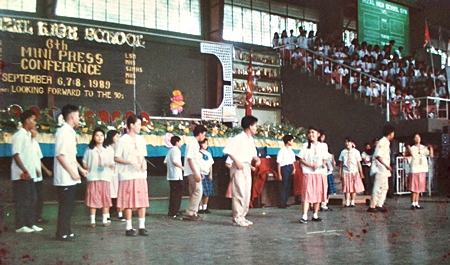 Some 15 students from the grade and high school departments attended the three-hour seminar I gave last Saturday. The lecture-seminar, coordinated by Ms. Imelda Ferrer, is part of the school's preparation for the Division Press Conference. Thanks to the students for their interest and enthusiasm and for bearing with my corny jokes and stories!
Some 15 students from the grade and high school departments attended the three-hour seminar I gave last Saturday. The lecture-seminar, coordinated by Ms. Imelda Ferrer, is part of the school's preparation for the Division Press Conference. Thanks to the students for their interest and enthusiasm and for bearing with my corny jokes and stories!
Tuesday, August 22, 2006
Photojournalism seminar, Maria Montessori Christian School (Pembo, Makati), August 19, 2006
Thursday, August 10, 2006
Photojournalism (30): Shooting portraits
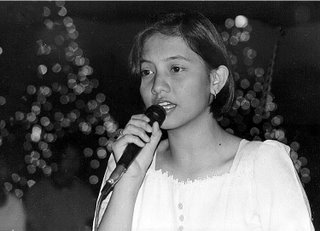 The essence of portraiture is to capture or express an individual’s personality, to show something about the person’s life or work. As such, portrait photography need not be confined within the studio; it encompasses all kinds of ways of portraying people (like the so-called “environmental portrait” which we’ll discuss below).
The essence of portraiture is to capture or express an individual’s personality, to show something about the person’s life or work. As such, portrait photography need not be confined within the studio; it encompasses all kinds of ways of portraying people (like the so-called “environmental portrait” which we’ll discuss below).
Furthermore, portraits can be close-ups, full shots (from head to foot) or long shots (the individual shown in relation to his or her environment).To do portrait photography on a limited, shoestring budget, we have to consider three things: the lens to use, the light source, and the physical setting.
You can use your standard 50 mm lens for portraits; maintain a distance of about 5 feet or more for a head and shoulders shot.
If you’re using a zoom or telephoto lens, take note of your minimum focusing distance.
The so-called “portrait lens” has a focal length of 85 or 90 mm.
Avoid using a wide angle lens for close-up portraits. Why? The lens will cause distortions and exaggerations of the nose, the forehead, etc. For environmental portraits however, you can use a wide angle lens.
What about digital cameras? Point and shoot digital camera models oftentimes have zoom lenses with a wide angle to telephoto range. Use the camera's wide angle setting for environmental portraits and the telephoto setting for head and shoulders portraits.
Light sources for portraits
Your light source can be your camera flash, ordinary room lights, or sunlight through windows or doors.
On-camera flash (that is, flash placed in what is known as your SLR camera’s hot shoe), however, gives a frontally lit portrait with harsh shadows in the background. Solution? Shoot from a high angle so that the shadows would be hidden behind your subject (we will be taking up flash photography later on).
Be careful if you’re using flash as your light source for portraits. Some people, react instinctively to flash by closing their eyes. Solution? Shoot a lot of pictures, so you’ll have a lot of pictures of your subject with eyes closed ... just kidding! What usually happens after the second or third burst of your flash is that the subject becomes used to the flash.
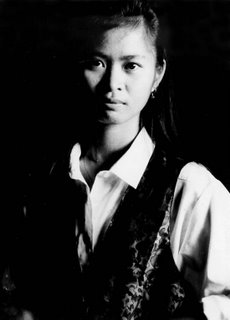 Since we’re doing portraits on a shoestring budget, the light source need not be expensive, elaborate studio lights with umbrellas, reflectors, etc. In the picture above, my yearbook staffers and I had covered up all the windows of an abandoned room with newspapers, thus plunging the whole room into darkness, except for the light coming from the slightly open door.
Since we’re doing portraits on a shoestring budget, the light source need not be expensive, elaborate studio lights with umbrellas, reflectors, etc. In the picture above, my yearbook staffers and I had covered up all the windows of an abandoned room with newspapers, thus plunging the whole room into darkness, except for the light coming from the slightly open door.The physical setting for portraits
In “environmental portraits,” we use the person’s natural, normal surroundings as the setting, instead of a studio. These could be any place where the setting could possibly say something about the person’s character.
The girl in the very first picture of this post was a very talented singer in our school a decade ago. Naturally, I wanted to show that aspect of her personality. I wanted a head and shoulders portrait, but decided that a horizontal format would be better than the usual vertical format for portraits. I also framed her between the Christmas trees. Since I had used my Vivitar 28-210 mm zoom lens set at its telephoto end and had shot her at about ten feet away, the lights became gorgeous looking, out of focus highlights. Looking back now, I really wish I had used color film to take this picture!
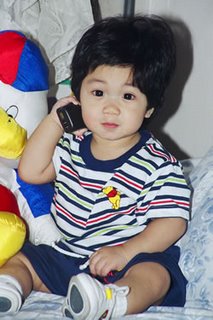
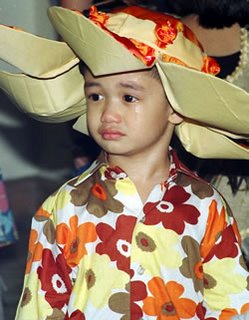 The pictures above (in full color!) are another example of environmental portraits. It’s a portrait of my nephew Gino in his natural environment – with his dolls and toys, and with a flower hat during a school presentation in Greenhills Christian Fellowship. Gino is cute because he looks like me. Hey, what can I say? Cuteness is in our genes!
The pictures above (in full color!) are another example of environmental portraits. It’s a portrait of my nephew Gino in his natural environment – with his dolls and toys, and with a flower hat during a school presentation in Greenhills Christian Fellowship. Gino is cute because he looks like me. Hey, what can I say? Cuteness is in our genes!Horizontal or vertical formats for portraits
Remember our lesson on formats? We usually shoot vertically when doing portraits. If you can’t decide however whether a vertical or horizontal format would be better, shoot your subject in both formats. Or, you can shoot a horizontal portrait like that of Rachelle in the first picture below. Later on, you can crop the image to come up with a vertical format portrait as in the next picture below.
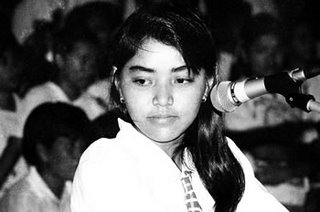
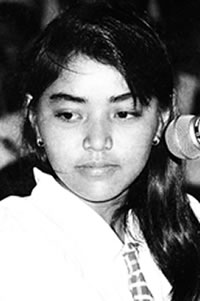 What if you want to shoot somebody’s portrait but you’re in the wrong location, you don’t have the right viewpoint as when your subject’s back is turned towards you as in the two pictures below? What do you do? Call out your subject’s name to get his or her attention. When your subject turns towards you, take the picture. For example, you can say, “Hey, Angel! Kahit isang sulyap lang, Darna!”
What if you want to shoot somebody’s portrait but you’re in the wrong location, you don’t have the right viewpoint as when your subject’s back is turned towards you as in the two pictures below? What do you do? Call out your subject’s name to get his or her attention. When your subject turns towards you, take the picture. For example, you can say, “Hey, Angel! Kahit isang sulyap lang, Darna!”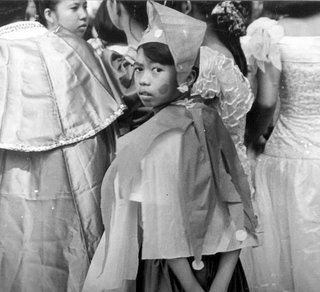
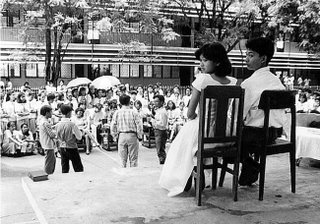 Practical suggestions in shooting portraits
Practical suggestions in shooting portraits(1) When you’re shooting pictures of someone wearing glasses, focus on the eyes, not on the eyeglasses. Also, ask your subject to pull his/her chin a little bit downward so that the eyeglasses won’t have unwanted reflections, as in the picture above.
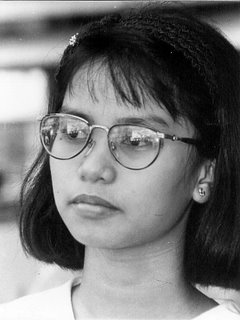
(2) Always play up your subject’s best features. The girl on the left in the picture below has very cute, very pronounced dimples, and so I took her picture from the side.
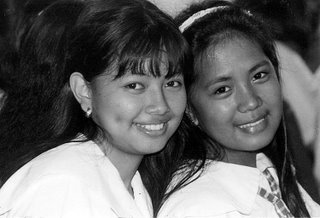
(3) Remember the picture below of my nephew JR? He’s cute, right? That’s because he looks like me! If you draw a diagonal line from the lower left hand corner up to the upper right hand corner, you’ll notice that the stuffed toy, JR’s eyes, nose and forehead all lie along that line. This line is known as the “picture diagonal,” and you should always strive to place the important elements of your photograph along this line. The picture diagonal, of course. may also extend from the lower right hand corner up to the upper left hand corner. (Please review the discussion on composition, specifically the topic on dynamic symmetry.)
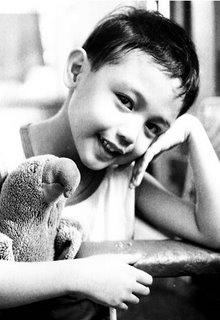 Portraits need not be of a single person only; there’s such a thing as group portrait, okay? You can liven up a portrait through the appropriate props.
Portraits need not be of a single person only; there’s such a thing as group portrait, okay? You can liven up a portrait through the appropriate props.(4) Use foreground and background blur
A blurred background or foreground is ideal for portraits since you would be “erasing” any distracting element, as in the two pictures below. Please review our lesson in foreground and background, ok?) If you are using however a point and shoot camera (whether film-based or digital) with a fixed focus lens, you cannot achieve this effect. You've got to use an SLR camera (whether film-based or digital) with a manual focus lens or with an autofocus lens that can be locked at a certain point or area of your image.
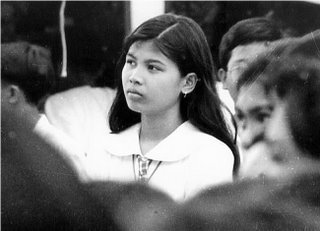
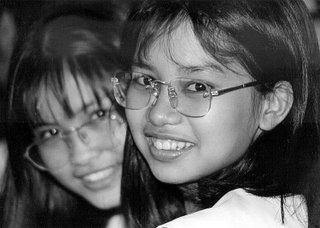
9 Photo Composition Tips (featuring Steve McCurry, 2002 Photographer of the Year, American Photo Magazine); Tip No. 7: Place the dominant eye in the center of the photo
Saturday, August 05, 2006
In memoriam: Henri Cartier-Bresson, father of photojournalism
Two years ago this day, Henri Cartier-Bresson died at age 95. Known as the father of photojournalism, he is best remembered for being one of the founders, along with David Seymour and controversial war photographer Robert Capa, of Magnum Photos in 1947, and for his concept of the “Decisive Moment” which is what photojournalism is all about. He defined decisive moment as “the simultaneous recognition, in a fraction of a second, of the significance of an event as well as the precise organization of forms which give that event its proper expression.”
Before taking up photography, Cartier-Bresson first studied painting where his major influence was Surrealism. He used only black and white film, available light (also known as “existing light”) and refused to crop his pictures.
As I explained several months ago when I began this series on photojournalism, this series is meant to help schoolpaper advisers from grade school and high schools all over the Philippines, and the participants to the photojournalism competitions in the various press conferences - division, regional and national levels. Please take the time to read the Introduction to this series.
Anyway, for every one of you who may be into photography as a serious hobby, as a bread-and-butter profession, as a class requirement, as part of your work as schoolpaper adviser, or as a photojournalism contestant, let’s take time to remember Cartier-Bresson, the man who started it for all of us.
Tuesday, July 11, 2006
Mini Press Conference, Rizal High School 1984 - 1991
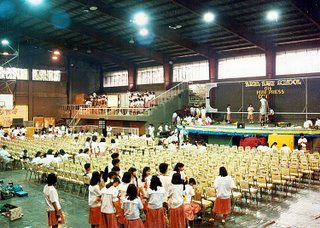 The Mini Press Conference was a yearly activity from 1984 up to 1991 among hundreds of journalism students from Rizal High School (Pasig), Quezon City Science High School, UP Integrated School, Colegio del Buenconsejo, La Immaculada Concepcion School, Pasig Catholic College, Ramon Magsaysay (Cubao) High School, Marikina High School, Philippine Science High School, and other schools. It was organized and hosted by Rizal High School for six years, with Quezon City Science High School hosting the conference in 1985 and 1987.
The Mini Press Conference was a yearly activity from 1984 up to 1991 among hundreds of journalism students from Rizal High School (Pasig), Quezon City Science High School, UP Integrated School, Colegio del Buenconsejo, La Immaculada Concepcion School, Pasig Catholic College, Ramon Magsaysay (Cubao) High School, Marikina High School, Philippine Science High School, and other schools. It was organized and hosted by Rizal High School for six years, with Quezon City Science High School hosting the conference in 1985 and 1987.
Resource speakers in the various conferences were prominent journalists and government personalities such as Max Soliven, Art Borjal, Teodoro Locsin Jr, Paulynn Sicam, Apa Ongpin, Mon Tulfo, Melinda Quintos de Jesus, Atty. Jerry Barican, Margot Baterina, Gel Santos Relos, Ninoy Sofranes, Defense Secretary Fidel Ramos, Senator Orly Mercado, Senator Rene Saguisag, and DAR Secretary Miriam Defensor Santiago.
Special groups that provided presentations throughout the eight years of the Mini Press Conference were the National Taekwondo Demonstration Team, the UP Taekwondo Team, the Wu Shu Federation of the Philippines, Arnis Philippines, and the UP Kontragapi.
 From the ranks of students who participated in the Mini Press Con have come some of today’s generation of journalists such as Phil. Daily Inquirer reporters Norman Bordadora (QC Science) and Ronnel Domingo (RHS); Ellaine Matienzo-Fuentes (RHS; Director, National News, Eagle Broadcasting); Manuel “Noel” Ferrer (QC Science; entertainment journalist and talent manager of movie stars); Cara Javier and Mylah Reyes-Roque (RHS; both former news reporters of RPN-9, with Mylah a recent UNICEF awardee for her article in Newsbreak magazine about child prisoners); and Michael Ac-Ac (RHS), former UP Collegian editor.
From the ranks of students who participated in the Mini Press Con have come some of today’s generation of journalists such as Phil. Daily Inquirer reporters Norman Bordadora (QC Science) and Ronnel Domingo (RHS); Ellaine Matienzo-Fuentes (RHS; Director, National News, Eagle Broadcasting); Manuel “Noel” Ferrer (QC Science; entertainment journalist and talent manager of movie stars); Cara Javier and Mylah Reyes-Roque (RHS; both former news reporters of RPN-9, with Mylah a recent UNICEF awardee for her article in Newsbreak magazine about child prisoners); and Michael Ac-Ac (RHS), former UP Collegian editor.
Other notable personalities from the ranks of Mini Press Con participants are Atty. Marnie Tonson (Phil. Science); Atty. Mary Grace Agcaoili (QC Science; UNICEF, East Asia and the Pacific Regional Office); RTC Judge Merideth delos Santos (QC Science); Daniel Saclute (RHS; graduated from Franklin and Marshall College and from Armand Hammer United World College in Montezuma, New Mexico USA); Naderev Saño (QC Science; Executive Director of Greenpeace Southeast Asia); Julius Cainglet (QC Science; Assistant Vice President of Federation of Free Workers); Joseph del Callar (Phil. Science; graduated from Massachusetts Institute of Technology and now with UC Berkeley); Robel M. Dela Paz (RHS; recipient of Monbusho Scholarship in Japan and graduated with degrees in Electronics and Information Engineering from Ishikawa National College of Technology and in Electronics and Electrical System Engineering from Nagaoka University of Technology); and Leilani Feliciano (RHS; First Secretary and Consul, Philippine Embassy and Permanent Mission of the Philippines to the United Nations in Vienna).
If you attended any of the Mini Press Conferences from 1984 up to 1991, please drop me a line in the comments section below. I’d like to hear from you. Maybe some of the friends from other schools whom you met during the Mini Press Con would also like to hear from you.
1984
 |
| Rizal High School and QC Science High School students during the very first Mini Press Con (1984) |
 |
| RHS Class 87 (IV-2) when they were 2nd year students during the 1st Mini Press Con, 1984, hosted by RHS |
 |
| Manuel Ferrer of QC Science |
1985
 |
| !985 Mini Press Con, hosted by QC Science; what marked the 8 years of the conference were the intense rivalry and great friendships between these two schools |
 |
| Registration, 1985 Mini Press Con |
 |
| Diwa (Quezon City Science High School) during the open forum |
 |
| QC Science students |
 |
| Mini Press Con hosted by QC Science (if I remember correctly, the girl on the left is named Ideth, while girl on the right is Nanette) |
 | |
| RHS Class 87 (IV-1 and IV-2) when they were 3rd year students, 2nd Mini Press Con, 1985, hosted by QC Science HS |
 |
| RHS Class 87 (IV-2) when they were 3rd year students, 2nd Mini Press Con, 1985, hosted by QC Science HS |
1986
 |
| Merideth delos Santos (QC Science HS) introducing Max Soliven (publisher of Phil. Star) during 3rd Mini Press Con, 1986, hosted by RHS |
 |
| Max Soliven, speaker in 1986 Mini Press Con |
 |
| Art Borjal, speaker in 1986 Mini Press Con |
 |
| Members of Himig Scientia (QC Science HS) giving a special number during 3rd Mini Press Con, 1986 |
 |
| Phil. Science HS students during 3rd Mini Press Con (1986); guy in front with umbrella is Marnie Tonson; to his left is Joseph Del Callar, and to Joseph’s left is Jaffy Azarraga |
 |
| Philippine Science students, 1986 Mini Press Con |
 |
| Marnie Tonson (Phil. Science HS) engages Max Soliven (publisher of Phil. Star) in a heated discussion during open forum, 3rd Mini Press Conference, 1986 |
 |
| RHS Class 88 students when they were 3rd year students, 3rd Mini Press Con, 1986 |
 |
| Special number during awarding ceremonies, 3rd Mini Press Conference, 1986 |
 |
| UP Diliman Taekwondo team demonstration, 3rd Mini Press Conference, 1986 |
 |
| RHS Class 87 girls (when they were 4th year students) during 1986 Mini Press Con, hosted by RHS |
 |
| 1986 Mini Press Con, with QC Science student named Raya during awarding ceremonies |
 |
| 1986 Mini Press Con hosted by Rizal High School (QC Science girls: on the left is Merideth delos Santos, girl in the middle, I think, is Tricia Endozo, while girl in blue shirt is Diwa) ) |

 |
| RHS Class 87 (IV-1) attended the first three Mini Press Conference from 1984 to 1986 |
1987
 |
| 1987 Mini Press Con hosted by QC Science High School; UPIS joined the conference for the first time (click the picture to view or download a much-bigger copy of this picture) |
 |
(Click the picture to view or download a much-bigger copy of this picture.) |
1988
 |
| Sen. Rene Saguisag, one of the speakers in the 1988 Mini Press Con |
 |
| QC Science students nearly sweeping the Filipino news writing contest |
 |
| Exhibition by the Wu Su Federation of the Philippines |
 |
| Edwin Quinsayas, RHS Class 90, serenading a girl from Quezon City Science (I think her name is Yohana Mehretab) |
 |
| QC Science student, 1988 (?) Mini Press Con |
 |
| E. Rodriguez Jr. High School student speaking to the participants |
 |
| QC Science boys on the way to 1988 (?) Mini Press Con |
 |
| E. Rodriguez Jr. High School student singing during closing ceremonies |
 |
| QC Science student speaking to the participants |
 |
| Campus tour, 1988 (?) Mini Press Con |
 |
| 1988 (?) Mini Press Con |
 |
| RHS Class 91 students (when they were 2nd year students) practicing their special number |
 |
| Special number; guy on the right is Ronnel Domingo, now a writer for Philippine Daily Inquirer |
 |
| Students from RHS, QC Science HS, Eulogio Rodriguez Jr HS during the closing ceremonies |
1989
 |
| Aileen Reyes (RHS Class 90) moderating the open forum |
 |
| RHS Class 90 students interviewing Congressman Rufino Javier, keynote speaker during opening ceremonies |
 |
| Glenn Sibonga (RHS Class 90) the only guy in a group presentation with girls from RHS, QCSHS, and UPIS |
 |
| Fun and games while waiting for announcement of winners |
 |
| UPIS student, 1989 (?) Mini Press Con |
 |
| Students from San Juan Municipal High School, 1989 (?) Mini Press Con |
 |
| QC Science students, 1989 (?) Mini Press Con |
 |
| National Tae Kwon Do Demonstration Team, 1989 (?) Mini Press Con |
 |
| Melanie Mabilangan, RHS student |
1990
 |
| Sen. Orly Mercado (keynote speaker) with Miss Diana C. Santos (RHS principal) |
 |
| Students from Colegio del Buenconsejo (1990 or 1991 Mini Press Con) |
 |
| Pasig Catholic College boys (1990 or 1991 Mini Press Con) |
 |
| Girls from CBC, RHS, and LICS enjoying the group presentations (1990 or 1991 Mini Press Con) |
 |
| Students from La Immaculada Concepcion School (1990 or 1991 Mini Press Con) |
 |
| Students from UP Integrated School (1990 or 1991 Mini Press Con) |
 |
| RHS Class 91 preparing the stage for the 7th Mini Press Con (1990) |
 |
| UPIS students with RHS students during campus tour (either 1990 or 1991 Mini Press Con) |
 |
| 1990 or 1991 Mini Press Con (students from RHS, Marikina HS and Colegio del Buenconsejo enjoying the disco before the awarding ceremonies |

 |
| 1990 (?) Mini Press Con |
 |
| 1990 (?) Mini Press Con |
 |
| 1990 (?) Mini Press Con |
 |
| 1990 (?) Mini Press Con |
 |
| LICS boys; QSci and RHS girls |

 |
| Students from Colegio Del Buenconsejo, 1990 (?) Mini Press Con |
 |
| Group presentation, 1990 Mini Press Con |
 |
| 1990 (?) Mini Press Con |
 |
| 1990 (?) Mini Press Con |
 |
| Group presentation, 1990 (?) Mini Press Con |
 |
| QC Science student, 1990 (?) Mini Press Con |
 |
| RHS students preparing for the welcome ceremonies, 1990 Mini Press Con |
 |
| Students from QC Science and Colegio Del Buenconsejo, 1990 (?) Mini Press Con |
 |
| 1990 (?) Mini Press Con; guy with the flag is Julius Cainglet of QC Science |
 |
| Student from Pasig Catholic College at the lectern, 1990 (?) Mini Press Con |
 |
| QC Science students, 1990 (?) Mini Press Con |
 |
| UPIS students, 1990 Mini Press Con |
 |
| Tri-media personality Apa Ongpin during 1990 Mini Press Conference |
 |
| Secretary Fidel Ramos (DND) |
 |
| Gladys and Kevin, RHS students |
1991
 |
| Gel Santos-Relos, TV news personality (speaker) |
 |
| 1991 Mini Press Con presentation by Kontragapi from UP Diliman, with RHS alumnae Ryan Abrecea (Class 90) and Rowena Serut (Class 88) |
 |
| Resource speakers: Jose Wendell Capili (UP Diliman); Teodoro Locsin Jr; Prof. Ceciliano Jose-Cruz (PNC); Solicitor-General Mel Chavez |
 |
| Teodoro Locsin Jr, and Melinda Quintos de Jesus with participants |
 |
| Group presentations |
 |
| Dong Puno, speaker |
 |
| Nini Gaviola was invited as a resource speaker, but she declined; however, she wrote a column addressed to the press con participants (click to view a bigger copy) |


















